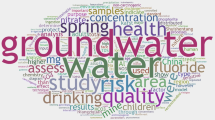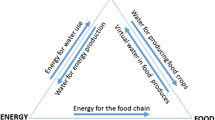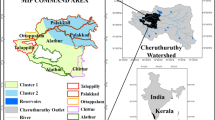Abstract
Based on two forecast scenarios (“conditional” and “sustainable development”) of water consumption for 2010 and 2025, prepared by the staff of the State Hydrological Institute at the beginning of this century, and data from the UN Food and Agriculture Organization, the current total (water withdrawal) and irretrievable water consumption for individual continents (parts of the world) and the world as a whole has been calculated. Water consumption in agriculture, industry, and the utilities sector is considered. Additional evaporation from reservoir water areas is taken into account. The average annual change in total and irretrievable water consumption for 2000−2017 has been determined, and with account for it, the expected water consumption in 2021 and the change in annual river runoff as a result of irretrievable water withdrawal have been assessed. The volume of waste and return waters and their dilution with river runoff resources are determined. The predominant role of Asia in world water consumption is revealed, mainly due to the use of water in agriculture, primarily in irrigated agriculture. It is also shown that in the world as a whole, especially in Asia, Europe, and North America, the multiplicity of dilution of waste and return waters with river runoff is low, which indirectly confirms the fact that rivers and water bodies are being polluted.




Similar content being viewed by others
REFERENCES
G. P. Kalinin, Problems of Global Hydrology (Gidrometeoizdat, Leningrad, 1968) [in Russian].
M. I. L’vovich, World Water Resources and Their Future (Mysl’, Moscow, 1974) [in Russian].
M. Falkenmark and G. Lindth, “How can we cope with the water resources situation by the year 2015?,” Ambio, No. 3, 114−121 (1974).
I. A. Shiklomanov, Study of Land Water Resources: Results, Problems, Prospects (Gidrometeoizdat, Leningrad, 1988) [in Russian].
V. P. Andressian, Forecasting Water Requirements for the Beginning of the 21st Century: A World-Scale Study (UNESCO, Paris, 1994).
J. Margat, Water Use in the World: Present and Future: Contribution au Project M-1–3 du Programme Hydrologique International (PHI-IV/UNESCO, Paris, 1994).
J. C. Rodda, “Guessing or assessment of the world’s water resources?,” J. Chart. Inst. Water Mgmt., No. 9, 360−368 (1995).
World Water Resources at the Beginning of the 21st Century, Ed. by A. Shikiomanov and J. Rodda (UNESCO, Cambridge Univ. Press, 2003).
A. P. Golikov and N. A. Kazakova, “Geography of world water consumption: State, dynamics, prospects,” Vestn Kharkiv. Nats. Umniv. im. V.N. Karazina, Ser.: Mizhnar. Vidnos. Ekon. Krainoznav. Tureizm, No. 8, 17−25 (2018).
WWAP (UNESCO World Water Assessment Programme). 2019. The United Nations World Water Development Report 2019: Leaving No One Behind (UNESCO, Paris, https://en.unesco.org/themes/water-security/wwap/wwdr/2019.
United Nations, The United Nations World Water Development Report 2021: Valuing Water. Paris: UNESCO. https://www.unwater.org/publications/un-world-water-development-report-2021/.
https://www.fao.org/aquastat/en/.
Water Resources of Russia and Their Use, Ed. by I.A. Shiklomanov (Gos. Gidrolog. Inst., St Petersburg, 2008) [in Russian].
I. A. Shiklomanov and J. A. Balonishnikova, “World water use and water availability: Trends, scenarios, consequences,” IAHS Publ., No. 281, 358−364 (2003).
Water Resources and Water Management in Russia in 2018: Statistical Compendium, Ed. by N. G. Rybal’skii and V. A. Omel’yanenko (NIA-Priroda, Moscow, 2019) [in Russian].
Funding
This study was supported within the framework of a State Assignment, RAS Institute of Geography АААА-А19-119021990093-8 (FMGE-2019-0007).
Author information
Authors and Affiliations
Corresponding authors
Ethics declarations
The authors declare that they have no conflicts of interest.
Additional information
Translated by B. Alekseev
Nikolai Ivanovich Koronkevich, Dr. Sci. (Geogr.), is Chief Researcher at the RAS Institute of Geography. Elena Alekseevna Barabanova, Cand. Sci. (Geogr.), is a Senior Researcher in the Laboratory of Hydrology at the same institute. Irina Sergeevna Zaitseva, Cand. Sci. (Geogr.), is a Leading Researcher in the above laboratory at the same institute.
Rights and permissions
About this article
Cite this article
Koronkevich, N.I., Barabanova, E.A. & Zaitseva, I.S. Assessment of Modern Water Consumption in the World and on Continents and Its Impact on the Annual River Runoff. Her. Russ. Acad. Sci. 92, 199–206 (2022). https://doi.org/10.1134/S1019331622020034
Received:
Revised:
Accepted:
Published:
Issue Date:
DOI: https://doi.org/10.1134/S1019331622020034




